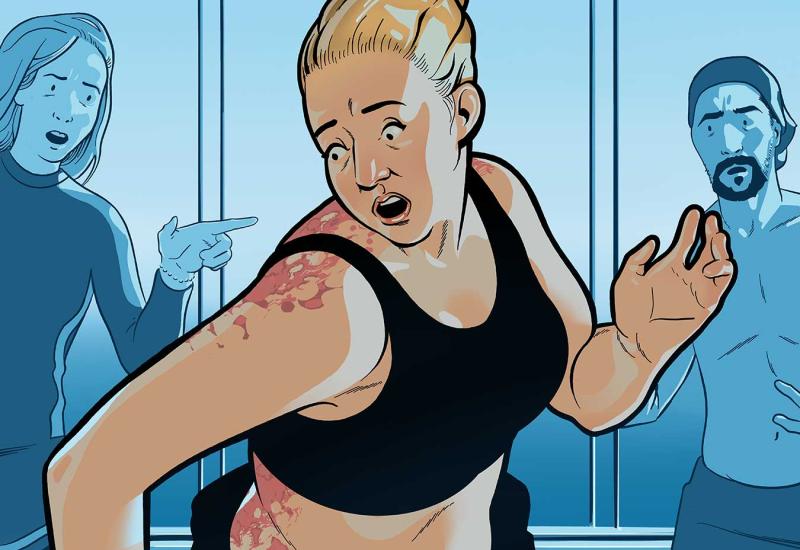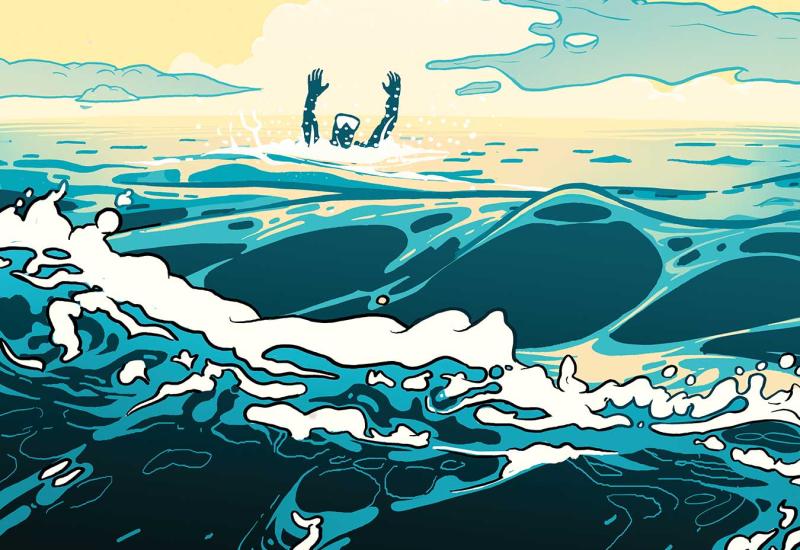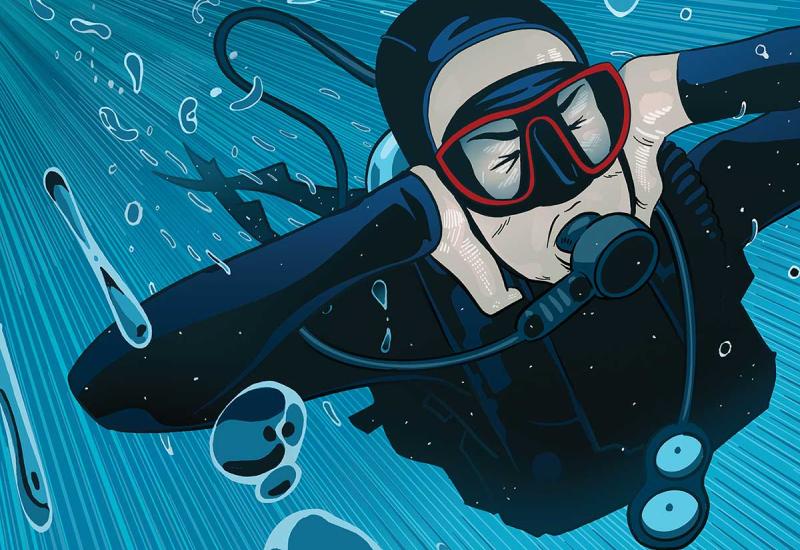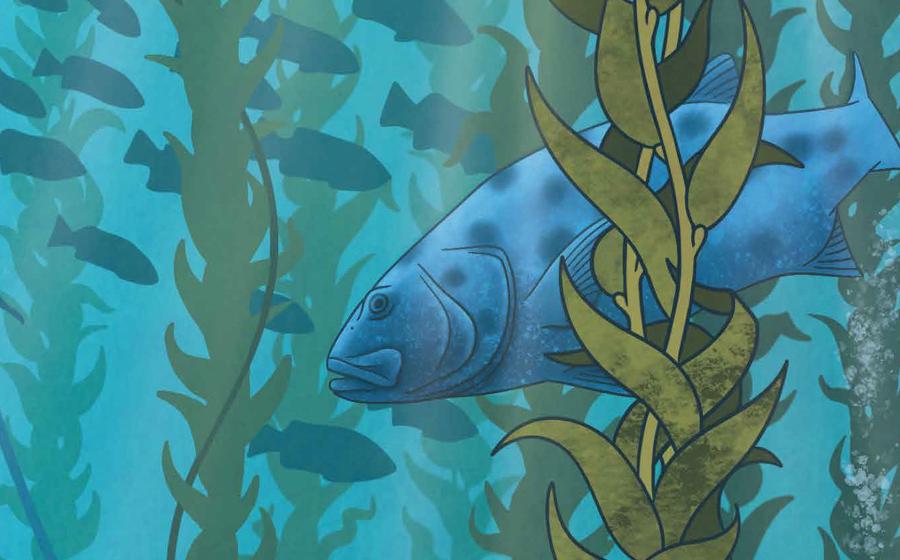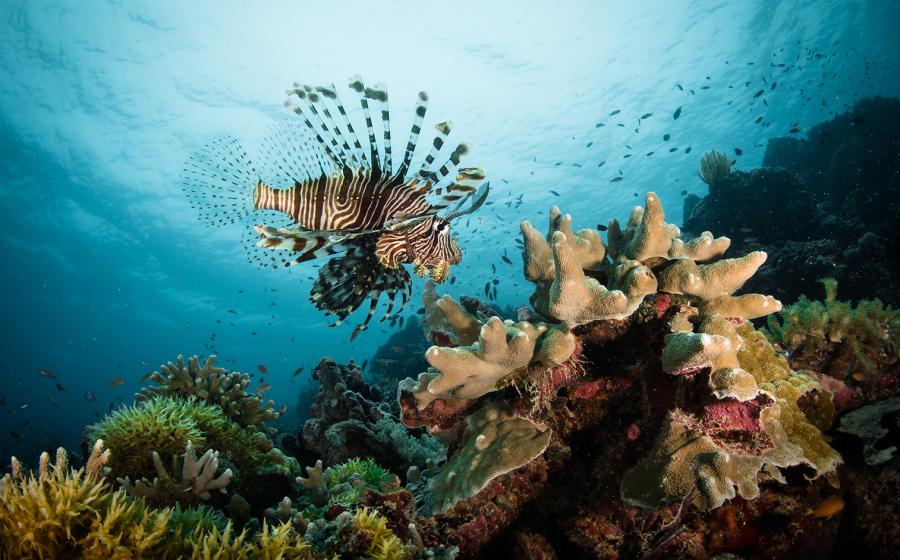Sweating the Small Stuff
January 2008
By Michael Ange
Bill surfaced in the lee of the boat. Protected from the rising wind, he cavalierly tossed his regulator aside and removed his mask. As the boat shifted, a light swell smacked him head on, like a scrappy boxer dealing short, persistent jabs to the face. The first mouthful of seawater took him by surprise. The second sent him into a panic. Then came a third, fourth, fifth ... Bill faintly heard Captain John order the boat crew to "go" and saw the divemaster silhouetted against the bright sun as he closed the gap. But Bill never did see his rescuer face to face--by the time he arrived, Bill was floating face down, his body undulating in the rolling swell.
The Diver
Bill, a healthy diver in his mid-forties, had between 20 and 30 dives under his belt and more confidence than his skills deserved--enough to get into significant trouble by thinking himself exempt from basic safety procedures. John was a hard-nosed captain who demanded a strict adherence to the rules and had a reputation for brusqueness, both with his crew and paying guests, but his rough manner came from his dedication to getting every diver safely back to shore, which usually earned him the respect of his crew and his customers.
Bill was an exception. Bristling at Captain John's direct nature, he discounted his rules, thinking them overstated. Bill had made a few dive trips to the islands and felt he could discern between necessary safety procedures and those drummed up by lawyers for liability purposes.
The Dive
Morning broke on a beautiful day as the divers gathered on the dock for their 8 a.m. departure. The boat left the channel and motored across mirror-flat Atlantic waters. Reaching their first dive site and tying quickly to the mooring, there was so little wind or current that the boat didn't even pull taut on the mooring line. The first dive went off without a hitch. They made a second dive on a shallow reef normally swept by a mild current, but today even that was nonexistent. After a leisurely exploration, the divers boarded the boat in buddy teams, reveling in their remarkable dive day.
The Accident
As the divers began to board, the wind shifted, pushing the boat around on its mooring. The seas were smaller than two feet, but the strong breeze made them choppy. Just in case, John's divemaster threw a trail line behind the boat for divers to hold while they waited to climb on board. While scanning the surrounding water, John spotted Bill astern--his mask in his hand, no regulator in his mouth. Immediately, he asked Bill if he was OK and screamed, "Put your mask back on!" Bill signaled an overhead OK and began swimming slowly back to the boat as his buddy, who had gone ahead at Bill's suggestion, began climbing the ladder.
As the boat shifted a bit farther on its mooring, it no longer sheltered Bill from the breeze. The first wave slapped him in the face; coughing and sputtering, Bill tried to regain control. He reached up, attempted to put his mask on and caught another jab that flooded his eyes, nose and mouth with saltwater. Struggling now, Bill began to panic. He lost control of his breathing, coughed up seawater and lost his mask in the process. Bill waved his arms and cried for help, but only a gurgle emerged as the small but persistent waves forced themselves upon him, depriving him of the air he so desperately needed. Then, everything went dark.
The Recovery
The divemaster reached Bill within moments of Captain John's order, rolling him onto his back while dumping his weights. Bill had stopped breathing, and the divemaster tried to force his own breaths down Bill's throat despite the waves' continued assault. Hooking his arm into the boat's trail line, he held Bill securely as John towed them in. Although it seemed like days, only minutes had passed from Bill's initial signs of distress to their frantic attempts at CPR back on board. John sped to the nearest dock where an ambulance waited to continue treatment and transport Bill to a local hospital. Despite everyone's efforts, the doctors pronounced Bill dead on arrival.
Analysis
The good conditions made Bill feel he could disregard accepted safety rules. Like many divers, he felt uncomfortable in his mask on the surface and immediately took it off in the calm conditions--the first in a series of mistakes that seemed minor at the time, but ultimately cost Bill his life. Initially, the boat sheltered Bill from the surface chop, but when it shifted, exposing him to the elements, he should have immediately replaced his mask. When he was struggling to control his breathing, he should have dumped his weight belt--this may have floated him far enough above the surface to get a breath. Replacing his regulator would have allowed him to breathe, even with the seas slapping him in the face. Finally, had they not separated, Bill's buddy could have helped him. Unfortunately, he did none of these things. In spite of a stellar reaction by the crew, this diver died from his mistakes. An investigation into the incident would later show that Bill had more than 1,000 psi in his tank when he drowned, and his equipment worked perfectly.
Lessons for Life
Stay with your buddy at all times, until you're back on the boat.
Always keep your mask and regulator firmly in place until you're on the boat and away from the boarding area.
Any time you encounter difficulty on the surface, inflate your BC and dump your weights.
If waves are giving you trouble on the surface, either submerge a few feet or turn your back to the swells until you can regain control.
Keep your ego in check. In diving, pride and arrogance often foreshadow tragedy.
Remember, conditions can change rapidly, so follow the rules and prepare for the unexpected.
January 2008
By Michael Ange
Bill surfaced in the lee of the boat. Protected from the rising wind, he cavalierly tossed his regulator aside and removed his mask. As the boat shifted, a light swell smacked him head on, like a scrappy boxer dealing short, persistent jabs to the face. The first mouthful of seawater took him by surprise. The second sent him into a panic. Then came a third, fourth, fifth ... Bill faintly heard Captain John order the boat crew to "go" and saw the divemaster silhouetted against the bright sun as he closed the gap. But Bill never did see his rescuer face to face--by the time he arrived, Bill was floating face down, his body undulating in the rolling swell.
The Diver
Bill, a healthy diver in his mid-forties, had between 20 and 30 dives under his belt and more confidence than his skills deserved--enough to get into significant trouble by thinking himself exempt from basic safety procedures. John was a hard-nosed captain who demanded a strict adherence to the rules and had a reputation for brusqueness, both with his crew and paying guests, but his rough manner came from his dedication to getting every diver safely back to shore, which usually earned him the respect of his crew and his customers.
Bill was an exception. Bristling at Captain John's direct nature, he discounted his rules, thinking them overstated. Bill had made a few dive trips to the islands and felt he could discern between necessary safety procedures and those drummed up by lawyers for liability purposes.
The Dive
Morning broke on a beautiful day as the divers gathered on the dock for their 8 a.m. departure. The boat left the channel and motored across mirror-flat Atlantic waters. Reaching their first dive site and tying quickly to the mooring, there was so little wind or current that the boat didn't even pull taut on the mooring line. The first dive went off without a hitch. They made a second dive on a shallow reef normally swept by a mild current, but today even that was nonexistent. After a leisurely exploration, the divers boarded the boat in buddy teams, reveling in their remarkable dive day.
The Accident
As the divers began to board, the wind shifted, pushing the boat around on its mooring. The seas were smaller than two feet, but the strong breeze made them choppy. Just in case, John's divemaster threw a trail line behind the boat for divers to hold while they waited to climb on board. While scanning the surrounding water, John spotted Bill astern--his mask in his hand, no regulator in his mouth. Immediately, he asked Bill if he was OK and screamed, "Put your mask back on!" Bill signaled an overhead OK and began swimming slowly back to the boat as his buddy, who had gone ahead at Bill's suggestion, began climbing the ladder.
As the boat shifted a bit farther on its mooring, it no longer sheltered Bill from the breeze. The first wave slapped him in the face; coughing and sputtering, Bill tried to regain control. He reached up, attempted to put his mask on and caught another jab that flooded his eyes, nose and mouth with saltwater. Struggling now, Bill began to panic. He lost control of his breathing, coughed up seawater and lost his mask in the process. Bill waved his arms and cried for help, but only a gurgle emerged as the small but persistent waves forced themselves upon him, depriving him of the air he so desperately needed. Then, everything went dark.
The Recovery
The divemaster reached Bill within moments of Captain John's order, rolling him onto his back while dumping his weights. Bill had stopped breathing, and the divemaster tried to force his own breaths down Bill's throat despite the waves' continued assault. Hooking his arm into the boat's trail line, he held Bill securely as John towed them in. Although it seemed like days, only minutes had passed from Bill's initial signs of distress to their frantic attempts at CPR back on board. John sped to the nearest dock where an ambulance waited to continue treatment and transport Bill to a local hospital. Despite everyone's efforts, the doctors pronounced Bill dead on arrival.
Analysis
The good conditions made Bill feel he could disregard accepted safety rules. Like many divers, he felt uncomfortable in his mask on the surface and immediately took it off in the calm conditions--the first in a series of mistakes that seemed minor at the time, but ultimately cost Bill his life. Initially, the boat sheltered Bill from the surface chop, but when it shifted, exposing him to the elements, he should have immediately replaced his mask. When he was struggling to control his breathing, he should have dumped his weight belt--this may have floated him far enough above the surface to get a breath. Replacing his regulator would have allowed him to breathe, even with the seas slapping him in the face. Finally, had they not separated, Bill's buddy could have helped him. Unfortunately, he did none of these things. In spite of a stellar reaction by the crew, this diver died from his mistakes. An investigation into the incident would later show that Bill had more than 1,000 psi in his tank when he drowned, and his equipment worked perfectly.
Lessons for Life
Stay with your buddy at all times, until you're back on the boat.
Always keep your mask and regulator firmly in place until you're on the boat and away from the boarding area.
Any time you encounter difficulty on the surface, inflate your BC and dump your weights.
If waves are giving you trouble on the surface, either submerge a few feet or turn your back to the swells until you can regain control.
Keep your ego in check. In diving, pride and arrogance often foreshadow tragedy.
Remember, conditions can change rapidly, so follow the rules and prepare for the unexpected.


